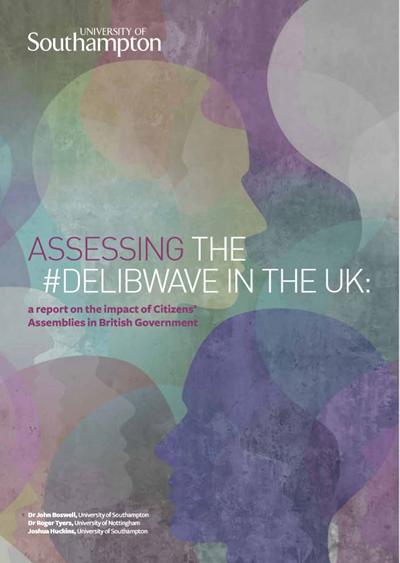
Written by: Dr John Boswell, University of Southampton Dr Roger Tyers, University of Nottingham Joshua Huckins, University of Southampton
Executive Summary
Citizens’ Assemblies (CAs) are groups of 40-150 randomly selected citizens, representing a cross-section of the community, who come together to discuss a complex and contested political issue. CAs have emerged as a new and exciting innovation within British politics. They offer the opportunity to engage citizens and create solutions to some of the most challenging policy issues.
This report outlines key findings from a comprehensive audit of the recent proliferation of these events across the UK and their impacts on politics and policy.
− A distinct UK blueprint for democratic innovation has emerged: CAs operate within a consistent framework, cemented by the support of charities that help to organise many of the events across the UK. These experts and practitioners have established a common approach, successfully adapting the Citizens’ Assembly model across different political contexts, and with varying levels of support and resourcing.
− The #Delibwave has had significant impact on public debate about British democracy: The increase in the use of CAs in Britain has led key actors in Parliament and the media to take notice of the effects that these participatory processes can have. The number of mentions of CAs within Parliament has dramatically risen since 2015. A similar pattern can also be identified from the number of mentions of CAs in the news and media. The impact of the COVID-19 crisis initially halted some of this momentum, but innovative champions in the democratic sector have successfully moved many activities online.
− Tangible impact on policy outcomes remains piecemeal and partial: Despite the contributions which CAs have made towards public debate, the impact on public policy has been limited. The recommendations of CAs that are delivered to government commissioning bodies are not yet reflected in policy action.
In response to these findings, we recommend taking several steps to consolidate the progress made in the #Delibwave and to enhance capacity for tangible impact on policy outcomes.
1. Increased attention requires continued investment in robust methods: As CAs grow in number and prominence, they are beginning to attract more critical scrutiny and attention. Sound investment to uphold standards in deliberation time, methods of selection, and expert facilitation can ensure these events are robust to common criticisms.
2. CAs need buy-in from a diversity of stakeholders: Support from across the political spectrum, including from key stakeholders on the relevant issue, is crucial.
3. There is a need to clarify the goals of CAs in advance, and connect them to deeper and broader forms of democratic participation: There is a risk that CAs become ‘feelgood’ one-off events that have little lasting impact. Taking steps to clarify the remit that CAs explore, and embedding events within a wider and vibrant public debate, will mitigate this risk.
4. Evaluating long-term impacts on policy development will help to stave off criticisms about tokenistic engagement: There are fears that CAs are mere gimmicks or public relations activities. To stave off these concerns, it is vital there is commitment to longterm evaluation of the concrete impact of CAs in public policy outputs and outcomes.